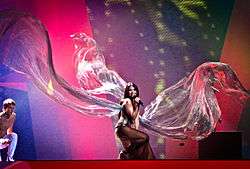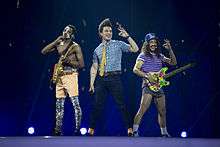France in the Eurovision Song Contest
| France | |
|---|---|
| Member station | |
| National selection events |
National final
Internal selection
|
| Appearances | |
| Appearances | 59 |
| First appearance | 1956 |
| Best result | 1st: 1958, 1960, 1962, 1969, 1977 |
| Worst result | Last: 2014 |
| External links | |
| French broadcaster page | |
| France's page at Eurovision.tv | |
|
France in the Eurovision Song Contest 2016 | |
France has participated in the Eurovision Song Contest 59 times since its debut at the very first contest in 1956. France is one of only seven countries to be present at the first contest, and has been absent from only two contests in its history, missing the 1974 and 1982 contests. France has won the contest five times, and along with Germany, Italy, Spain and the United Kingdom is one of the "Big Five" who are automatically allowed to participate in the final because they are the five biggest financial contributors to the European Broadcasting Union (EBU).
France first won the contest in 1958 with "Dors, mon amour" performed by André Claveau. In the 1960s, they won three times, with "Tom Pillibi" performed by Jacqueline Boyer in 1960, "Un Premier Amour" performed by Isabelle Aubret in 1962 and "Un jour, un enfant" performed by Frida Boccara, who won in 1969 in a four-way tie with the Netherlands, Spain and the United Kingdom. France's fifth victory came in 1977, when Marie Myriam won with the song "L'oiseau et l'enfant". France have also finished second four times, with Paule Desjardins in 1957, Catherine Ferry in 1976, Joëlle Ursull in 1990 and Amina in 1991, who lost out to Sweden's Carola in a tie-break.
After reaching the top five in 24 contests in the 20th century, France has had less success in the 21st century, only making the top five twice, with Natasha St-Pier fourth in 2001 and Sandrine François fifth in 2002. France finished last for the first time in 2014, when Twin Twin received only two points. France have failed to reach the top 10 in 12 of the last 14 contests, the exceptions being Patricia Kaas, who was eighth in 2009, and Amir, who was sixth in 2016.
Organisation
Several French broadcasters have been used to present Eurovision in the country, formerly RTF (1956–64), ORTF (1965–74) and TF1 (1975–81). Since 1983, France Télévisions has been responsible for France's participation in the contest, with the final being broadcast on France 2 (1983–98) and France 3 (1999–2014), and the semi-final which France votes in broadcast on France 4 (2005–10, 2016) and later France Ô (2011–15). The first semi-final in 2004 was not broadcast. From 2015, France 2 resumed the responsibility of organising an entry and broadcasting the final and from 2016, both semi-finals will be broadcast by France 4. The change is an attempt to secure better ratings and results in forthcoming contests. Radio coverage has been provided, although not every year, by France Inter from 1971 to 1998 and since 2001, France Bleu (also 1976). In 1982, RTL Radio transmitted the contest due to the country's absence that year.
France has often changed the selection process used in order to find the country's entry for the contest, either a national final or internal selection (occasionally a combination of both formats) has been held by the broadcaster at the time.
Contest history
France is one of the most successful countries in the Eurovision, winning the contest five times, coming second four times and coming third seven times. France was ranked first in number of victories (either alone or tied with other countries) without interruptions from 1960 to 1993. Moreover, Amina was close to victory with the song "Le Dernier qui a parlé..." in 1991, when she finished in joint first place (with the same number of points as Sweden). Therefore, the 'countback' rule applied, but both countries had an equal number of twelve points (four lots), but the victory went to Sweden, when France had fewer 10-point scores. Today, with the new rules, France would have won the competition, because they received points from more countries than Sweden. One year before, France was also close to winning with Joëlle Ursull performing Serge Gainsbourg's song "White and Black Blues". The song finished in equal second place with Ireland's entry.
However, in recent years, the French results have been somewhat disappointing. Since 1998, when the televoting was invented, France has almost always been in the bottom-10 countries in the final, coming 18th (2003 and 2008), 19th (1999), 22nd (2006, 2007 and 2012), 23rd (2000, 2005 and 2013), 24th (1998) and 25th (2015). France finished in last place, for the first time in their Eurovision history, in 2014 with only 2 points.
Yet, France have had some good results during the 21st century. In 2001, Canadian singer Natasha St-Pier came 4th for France with her song "Je n'ai que mon âme", being the favourite to win the contest by fans and odds. This good result was carried into the 2002 contest, when Sandrine François came 5th with "Il faut du temps" and received the Marcel Bezençon international press award for the best entry of that year. Finally, the positive experience with Sébastien Tellier in 2008 created considerable interest among the French show business for the contest, which resulted in the fact that Eurovision is seen now in the French media as a great advertising campaign and it has been decided that big names will represent France in the future. With these ambitions, the French superstar Patricia Kaas represented France in the Eurovision Song Contest 2009 in Moscow, Russia. Kaas is one of the most successful French-speaking singers in the world and she has sold over 16 million records worldwide.[1] She ended in 8th place. Kaas received the Marcel Bezençon artistic award, which was voted on by previous winners and presented to the best artist. In the 2016 Contest in Stockholm, Sweden, Amir with his song, "J'ai cherché", ended in 6th place and broke the record by scoring the most points in France's Eurovision history, by scoring 257 points in the final.
Absences
Since their debut in 1956 France has only missed two contests, in 1974 and 1982. In 1974, after selecting a singer and song to represent them at the contest, France withdrew after the President of France Georges Pompidou died in the week of the contest.[2] If they had participated in the contest, France would have been represented by Dani with the song "La vie à vingt-cinq ans".
In November 1981, TF1 declined to enter the Eurovision Song Contest for 1982, with the head of entertainment, Pierre Bouteiller, saying, "The absence of talent and the mediocrity of the songs were where annoyance set in. Eurovision is a monument to inanity [sometimes translated as "drivel"]."[3] Antenne 2 took over the job due to public reaction of TF1's withdraw, hosting a national final to select their entry as well, from the 1983 contest.
France and the "Big Five"
Since 1999, four particular countries have automatically qualified for the Eurovision final, regardless of their positions on the scoreboard in previous Contests.[4] They earned this special status by being the four biggest financial contributors to the EBU. These countries are the United Kingdom, Germany, France and Spain. Due to their untouchable status in the Contest, these countries became known as the "Big Four". Italy returned to the contest in 2011, thus becoming part of a "Big Five".[5][6]
Contestants
- Table key
NOTE: The full results for the first contest in 1956 are unknown, only the winner was announced. The official Eurovision site lists all the other songs as being placed second.
Voting history
As of 2016, France's voting history is as follows:
|
|
|
||||||||||||||||||||||||||||||||||||||||||||||||||||||||||||||||
Hostings
| Year | Location | Venue | Presenters |
|---|---|---|---|
| 1959 | Cannes | Palais des Festivals | Jacqueline Joubert |
| 1961 | |||
| 1978 | Paris | Palais des Congrès | Denise Fabre and Léon Zitrone |
Other awards
Marcel Bezençon Awards
Press Award
| Year | Song | Performer | Final Result | Points | Host city |
|---|---|---|---|---|---|
| 2002 | "Il faut du temps" | Sandrine François | 5th | 104 | Tallinn |
Artistic Award (Voted by previous winners)
| Year | Performer | Song | Final Result | Points | Host city |
|---|---|---|---|---|---|
| 2009 | Patricia Kaas | "Et s'il fallait le faire" | 8th | 107 | Moscow |
Composer Award
| Year | Song | Composer(s) Lyrics (l) / Music (m) |
Performer | Final Result |
Points | Host city |
|---|---|---|---|---|---|---|
| 2011 | "Sognu" | Daniel Moyne (m), Quentin Bachelet(m) and Jean-Pierre Marcellesi (l), Julie Miller (l) |
Amaury Vassili | 15th | 82 | Düsseldorf |
OGAE Eurovision Song Contest Poll
| Year | Song | Performer | Final Result | Points | Host city |
|---|---|---|---|---|---|
| 2016 | "J'ai cherché" | Amir | 6th | 257 | Stockholm |
Commentators and spokespersons
Since their debut in 1956 French television have sent their best television presenters and entertainers including Pierre Tchernia, Léon Zitrone, Robert Beauvais, Olivier Minne, Michel Drucker, Patrick Sabatier and Laurent Boyer. Every year until 1979 Monaco shared the French commentary.
| Year(s) | Grand Final Television Commentator | Grand Final Dual Television Commentator | Spokesperson | Semi Final Television Commentator | Semi Final Dual Television Commentator |
|---|---|---|---|---|---|
| 1956 | Michèle Rebel | No Dual Television Commentator | N/A | No Semi Finals | No Semi Finals |
| 1957 | Robert Beauvais | Claude Darget | |||
| 1958 | Pierre Tchernia | Armand Lanoux | |||
| 1959 | Claude Darget | Marianne Lecène | |||
| 1960 | Pierre Tchernia | Armand Lanoux | |||
| 1961 | Robert Beauvais | ||||
| 1962 | Pierre Tchernia | André Valmy | |||
| 1963 | Armand Lanoux | ||||
| 1964 | Robert Beauvais | Claude Darget | |||
| 1965 | Pierre Tchernia | Jean-Claude Massoulier | |||
| 1966 | François Deguelt | ||||
| 1967 | Pierre Tchernia | ||||
| 1968 | |||||
| 1969 | |||||
| 1970 | |||||
| 1971 | Georges de Caunes | N/A | |||
| 1972 | Pierre Tchernia | ||||
| 1973 | |||||
| 1974 | Did not participate | ||||
| 1975 | Georges de Caunes | Michel Drucker | |||
| 1976 | Jean-Claude Massoulier | ||||
| 1977 | Georges de Caunes | ||||
| 1978 | Léon Zitrone | Denise Fabre | TBC | ||
| 1979 | Marc Menant | No Dual Television Commentator | Fabienne Égal | ||
| 1980 | Patrick Sabatier | ||||
| 1981 | |||||
| 1982 | Andre Torrent | Did not participate | |||
| 1983 | Léon Zitrone | Geneviève Moll | |||
| 1984 | Gillette Aho | ||||
| 1985 | Patrice Laffont | Élisabeth Tordjman | |||
| 1986 | Patricia Lesieur | ||||
| 1987 | Patrick Simpson-Jones | Lionel Cassan | |||
| 1988 | Lionel Cassan | Catherine Ceylac | |||
| 1989 | Marie-Ange Nardi | ||||
| 1990 | Richard Adaridi | Valérie Maurice | |||
| 1991 | Léon Zitrone | Marie-France Brière | |||
| 1992 | Thierry Beccaro | Laurent Romejko | |||
| 1993 | Patrice Laffont | ||||
| 1994 | |||||
| 1995 | Olivier Minne | Thierry Beccaro | |||
| 1996 | Laurent Broomhead | ||||
| 1997 | Frédéric Ferrer & Marie Myriam | ||||
| 1998 | Chris Mayne | Laura Mayne | Marie Myriam | ||
| 1999 | Julien Lepers | No Dual Television Commentator | |||
| 2000 | |||||
| 2001 | Marc-Olivier Fogiel | Dave | Corinne Hermès | ||
| 2002 | Marie Myriam | ||||
| 2003 | Laurent Ruquier | Isabelle Mergault | Sandrine François | ||
| 2004 | Elsa Fayer | Alex Taylor | No broadcast | No broadcast | |
| 2005 | Julien Lepers | Guy Carlier | Marie Myriam | Peggy Olmi | No Dual Commentator |
| 2006 | Michel Drucker | Claudy Siar | Sophie Jovillard | Eric Jeanjean | |
| 2007 | Julien Lepers | Tex | Vanessa Dolmen | Yann Renoard | |
| 2008 | Jean-Paul Gaultier | Cyril Hanouna | |||
| 2009 | Cyril Hanouna | Julien Courbet | Yann Renoard | ||
| 2010 | Stéphane Bern | Audrey Chauveau | |||
| 2011 | Laurent Boyer | Catherine Lara | Cyril Féraud | Audrey Chauveau | Bruno Berberes |
| 2012 | Cyril Féraud | Mireille Dumas | Amaury Vassili | ||
| 2013 | Marine Vignes | ||||
| 2014 | Natasha St-Pier | Elodie Suigo | |||
| 2015 | Stéphane Bern | Marianne James | Virginie Guilhaume | Mareva Galanter | Jérémy Parayre |
| 2016 | Elodie Gossuin | Marianne James | Jarry | ||
| 2017 | TBA | TBA | TBA |
Photogallery
-
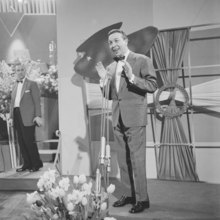
André Claveau in Hilversum (1958)
-
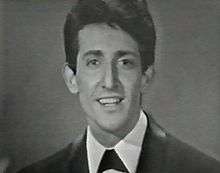
Guy Mardel in Naples (1965)
-
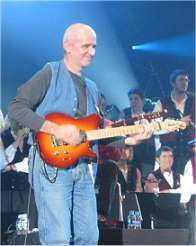
Dan Ar Braz in Oslo (1996)
-
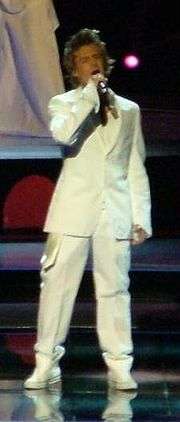
Jonatan Cerrada in Istanbul (2004)
-
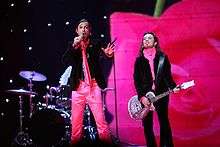
Les Fatals Picards in Helsinki (2007)
-
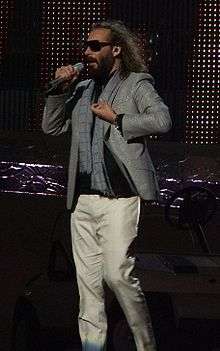
Sébastien Tellier in Belgrade (2008)
-
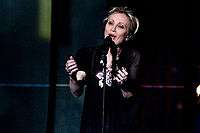
Patricia Kaas during rehearsals in Moscow (2009)
-
Jessy Matador in Oslo (2010)
-
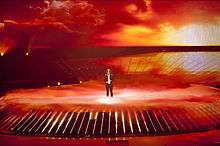
Amaury Vassili in Düsseldorf (2011)
-

Amandine Bourgeois at Malmö (2013)
-

Lisa Angell at Vienna (2015)
See also
- France in the Junior Eurovision Song Contest
- France in the Eurovision Young Dancers
- France in the Eurovision Young Musicians
References
- ↑ kabaretkaas.com
- ↑ History - Eurovision Song Contest 1974 Eurovision.tv
- ↑ 1982 Eurovision source in French
- ↑ O'Connor, John Kennedy (2005). The Eurovision Song Contest 50 Years The Official History. London: Carlton Books Limited. ISBN 1-84442-586-X.
- ↑ http://www.oikotimes.com/v2/index.php?file=articles&id=234
- ↑ Fulton, Rick (2007-05-14). "The East V West Song Contest". Daily Record. Retrieved 2009-05-24.
- 1 2 Barclay, Simon (June 17, 2010). The Complete and Independent Guide to the Eurovision Song Contest 2010. Silverthorn Press. p. 24. ISBN 978-1-4457-8415-1.
External links
- French Eurovision site
- French website
- Points to and from France eurovisioncovers.co.uk

